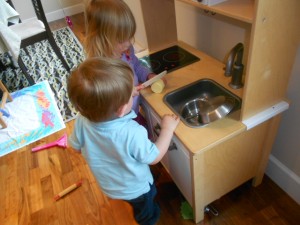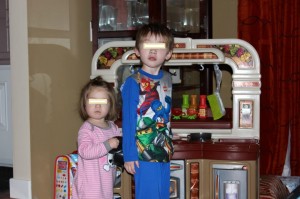Play Kitchens Cook Up Brain Food
Play kitchens are often a popular choice for young children and can support their early development. Preschool children’s early education is delivered through PLAY, so it’s critical for us to provide opportunities and to extend the ways kids can play. The kinds of toys and experiences young kids have for play will influence not just their play but their learning too.
 When we think of children as smart, we are often referring to using big words or knowing numbers and letters, but there many ways to be smart, including life skills. A child’s kitchen will encourage life-skill and other play. In a play kitchen, kids are imitating the adult world. They are practicing what it feels like to make so many decisions, figuring out what events happen in what order, and interacting with others.
When we think of children as smart, we are often referring to using big words or knowing numbers and letters, but there many ways to be smart, including life skills. A child’s kitchen will encourage life-skill and other play. In a play kitchen, kids are imitating the adult world. They are practicing what it feels like to make so many decisions, figuring out what events happen in what order, and interacting with others.
We can support this play by what we do in the kitchen. For instance, when you are making a meal, talk out loud about what you need to do first. You might say, “I need to put the cereal in the bowl before I pour on the milk.” Count and use numbers in your work that the child can use in play.
Play kitchens can be a small space in a room. Mud kitchens outside are another marvelous option. Instead of purchasing, a play kitchen can be made with boxes and a few recycled items. Cut a door in a tall box to make a fridge. Shelves can be added by making narrow slots on the sides and sliding in flat pieces of cardboard that will stick out just a bit. On a smaller box, to make a stove, glue 4 circles to be the burners and cut out a door for the oven. Add some inexpensive items like unbreakable dishes, empty boxes from groceries, plastic foods, and other containers. Children’s imagination will supply the rest.
Children will play over and over in their kitchen space–boys as well as girls. In their pretend play, they will solve problems, plan, and organize. We can also participate and play along or let them play independently as well as with other children. Including kids in our activities in the kitchen provides them a model to imitate. Using lots of language for what we are doing gives kids the words and language patterns to use in their play.
 Children get to practice how to meet one of their most basic needs-food. Food is itself an ingredient in many life experiences of interacting with others. Much of our cultures revolve around preparing and eating food. A play kitchen is an opportunity for children to develop and learn important life skills and make critical brain connections. As adults and caregivers what we do can expand how children play and influence their learning. Does your child have a play kitchen?
Children get to practice how to meet one of their most basic needs-food. Food is itself an ingredient in many life experiences of interacting with others. Much of our cultures revolve around preparing and eating food. A play kitchen is an opportunity for children to develop and learn important life skills and make critical brain connections. As adults and caregivers what we do can expand how children play and influence their learning. Does your child have a play kitchen?
